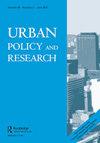Perhaps Hope is Not What We Need
IF 1.7
3区 社会学
Q4 ENVIRONMENTAL STUDIES
引用次数: 0
Abstract
Bravo Steve, for your fine take on a completely unreasonable topic. It’s just too big to meaningfully deal with, but your summary of the ills of the world is right-on and it is hard to have hope. The answers you proffer are good answers indeed, and their realisation will be so qualified that I’m not excited by their prospects. Our esteemed colleague Kurt Iveson, who is following me in this discussion, will say there are always instances of everyday equalities, inspiring practices, wonderful things happening in the interstices and reasons for hope, but they’re narrowing aren’t they? Always getting squeezed and built out. Yes of course they pop up elsewhere in different forms and expressions, but they are small and the spatial opportunities are becoming fewer. Sometimes I think we cling to this line of optimism because we have to believe, until it become almost religious in its fervour – we have to have hope. The theme of the RGS-IBG Urban Geography Research Group 2021 conference was Cities of Hope, 20 years after Harvey’s Spaces of Hope and some kind of tribute, but, really? With Harvey’s little epilogue manifesto even farther from most people’s lives than ever – except perhaps on the most intimate and privileged of scales – what is there hopeful to say? Tom Slater of the University of Edinburgh said to me years ago that if dancing around a tree and calling it transformative is the culmination of urban geography’s contribution to social change – my fine former PhD student Dr Prashanti Mayfield calls it happy clappy urbanism – he’s out (of the conference circuit, I think he meant. He’s certainly still present, thank goodness). We – by which I mean, urban, human, economic, cultural geographers, planners and social theorists, those listening to the streamed conference or reading this issue of UPR – have a serious problem. Not only are we talking more esoterically, but we’re talking more and more to ourselves. I’m by no means the first to observe this, but our increasingly arcane theorising is reaching fewer people, even as we know it. Many disciplines do this, speak internally in jargon – it is a way of measuring and establishing status amongst our peers – but we have to acknowledge it is not reaching the people who need to hear it, and it is clearly not changing anything that Steve is talking about. We have a bigger problem too of course, which is that even if we werewriting and speaking to the halls of power in language they understood, their occupants still wouldn’t want to hear. Steve’s argument for making the obvious economic case, and his perfectly rational plea for evidenced, consistent messages on inequality-busting policy reforms to swing political will, doesn’t address the depth of the entrenched social and sociopathic ideology. Let me draw one illustration of the difficulty of that task in the immediate term: The anti-vax/anti-lockdown/anti-authoritarian “freedom” fighters, supported by their strange bedfellows from QAnon and the far-right, received political and media attention that those of the equally disparate Left can only dream about. Did the anti-mandate protests attract more people than Black Lives Matter rallies? Who even knows the numbers – the obfuscation here is straight out也许希望不是我们所需要的
史蒂夫,太棒了,你在一个完全不合理的话题上表现得很好。它太大了,无法有效地处理,但你对世界弊病的总结是正确的,很难抱有希望。你提供的答案确实是很好的答案,它们的实现将是如此的有限,以至于我对它们的前景并不感到兴奋。我们尊敬的同事库尔特·艾弗森(Kurt Iveson),他也跟着我一起参加了这次讨论,他会说,每天都有一些平等的例子,鼓舞人心的做法,在空白中发生的奇妙的事情和希望的理由,但它们正在缩小,不是吗?总是被挤压和建造。是的,它们当然会以不同的形式和表达出现在其他地方,但它们很小,空间机会越来越少。有时我想,我们之所以坚持这种乐观主义,是因为我们必须相信——直到它变得近乎宗教般的狂热——我们必须抱有希望。RGS-IBG城市地理研究小组2021年会议的主题是“希望的城市”,这是在哈维的“希望空间”和某种致敬20年后,但是,真的吗?随着哈维的小小结语宣言比以往任何时候都离大多数人的生活更远——也许除了在最亲密和特权的尺度上——还有什么希望说的呢?爱丁堡大学(University of Edinburgh)的汤姆•斯莱特(Tom Slater)多年前曾对我说,如果绕着树跳舞并称之为变革,是城市地理学对社会变革贡献的顶点——我的优秀前博士生普拉珊蒂•梅菲尔德(Prashanti Mayfield)博士称之为快乐雀跃的城市主义——我想他的意思是,他已经退出了会议圈。他当然还在,谢天谢地)。我们——我指的是城市、人类、经济、文化地理学家、规划师和社会理论家,那些收听流媒体会议或阅读本期普遍定期审议的人——面临着一个严重的问题。我们不仅在更深奥地交谈,而且在越来越多地自言自语。我绝不是第一个观察到这一点的人,但即使我们知道,我们越来越晦涩的理论也越来越少的人接触到。许多学科都是这样做的,内部用行话说话——这是一种衡量和在同行中建立地位的方式——但我们必须承认,它并没有传达给需要听到它的人,而且它显然没有改变史蒂夫所说的任何东西。当然,我们还有一个更大的问题,那就是即使我们用他们能理解的语言写信和说话,他们的主人仍然不想听。史蒂夫提出的显而易见的经济案例,以及他对证据的完全理性的请求,关于打破不平等的政策改革以动摇政治意愿的一致信息,并没有解决根深蒂固的社会和反社会意识形态的深度。让我举一个例子来说明这项任务在短期内的困难:反疫苗/反封锁/反专制的“自由”战士,在他们来自QAnon和极右翼的奇怪同床异梦的支持者的支持下,获得了政治和媒体的关注,而那些同样截然不同的左翼人士只能做梦了。反强制令抗议活动是否比“黑人的命也是命”集会吸引了更多的人?谁知道这些数字——这里的困惑是显而易见的
本文章由计算机程序翻译,如有差异,请以英文原文为准。
求助全文
约1分钟内获得全文
求助全文

 求助内容:
求助内容: 应助结果提醒方式:
应助结果提醒方式:


